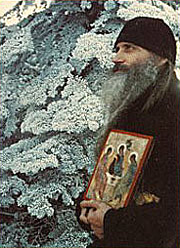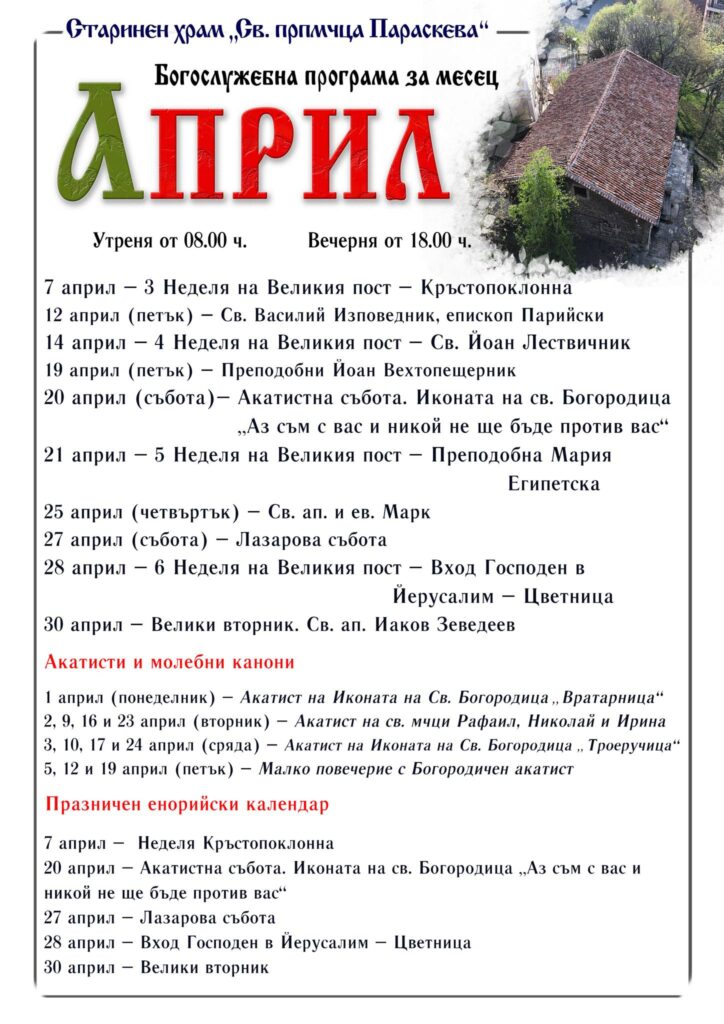Category Archives: Features

Mandamados, Home of the Archangel Michael
„На много места по света се почита паметта ми, но в Мандамадос е моят дом”… Това били думи на самия св. архангел Михаил, когато се явил на млад мъж от Атина със заповед да отнесе меч в манастира му край с. Мандамадос на о. Лесвос. И наистина, благочестивите поклонници, дошли тук, усещат с цялото си сърце и душа, че се намират на особено място – неизчерпаем извор на благодатни чудеса, непресъхващ дори до днес, а според силата на вярата умножаващи се за прослава на Божието свято име. Чудотворната релефна икона на св. Архангел Михаил Известна е в целия гръкоезичен православен свят чудотворната икона на св. архангел Михаил от манастира „Таксиархи” край Мандамадос. Тя е релефна и уникална по своя вид, защото е моделирана от глина, замесена с кръвта на осемнадесет монаси, посечени от сарацински пирати в далечния Х в. Преданието е запазило жива историята за създаването на иконата… От края на IX до края на ХI в. сарацинските пиратски нападения били непрестанни по островите на Византийската империя. Пиратите били „ужасът” на островното население, плячкосвали, грабели и убивали необезпокоявано. Отвличали мъже, жени и деца, а после ги продавали в робство по богатите тържища на Изтока… Пирати предвождани от някой си Ширхан

For 2017, Resolve to Acquire the Spirit of Peace
If you’re still looking for a New Year’s resolution, you couldn’t do better than to try the best-known instruction of a 19th-century Russian monk named Seraphim of Sarov: “Acquire the Spirit of Peace, and thousands around you will be saved.” Far from naive, religious fluff or spiritual psychobabble, these words of a forest-dwelling hermit who became one of the most revered saints of Orthodox Christianity are eminently practical. For example, I try (and often fail) to remember them when I turn on the news or pick up a paper, and find myself assaulted by the abundant evidence of the Fall. It’s so easy to become cynical as a result of the darkness one encounters, even second-hand through media, that I’ve actually fasted from news as much as possible ever since Advent began. One could say I’m burying my head in the sand to avoid the “real world.” Yet I challenge whether the news presents an accurate, proportioned view of reality. And I assert that my abstinence, an effort to follow St. Seraphim’s advice, is actually very real world. Because in the face of wars, shootings and the fascination with obscenity that can be brought to my living room each night,

A Homily given on the Sunday of the Blind Man
Автор: ставроф. иконом Иван Л. Кондаков “И като минаваше, видя един човек, сляп по рождение” (Иоан 9:1) Братя и сестри, Когато някой от нас страда от телесен или душевен недъг, склонни сме да мислим, че Бог ни е наказал за голямо прегрешение. Срещнем ли нещастник, мислим, че той носи последиците на лични или наследствени прегрешения. Така мислили и учениците на Господа Иисус, когато видели пред храма един млад просяк, сляп по рождение. Те запитали Иисуса Христа: “Кой е съгрешил, тоя или родителите му, за да се роди сляп?” (Иоан 9:2) Иисус отговорил: “Нито тоя е съгрешил, нито родителите му, но това биде, за да се явят делата Божии върху му… Плюна на земята, направи калчица от плюнката и намаза с нея очите на слепия. И му рече: иди се умий в къпалнята Силоам. Той отиде, уми се и се върна прогледнал” (Иоан 9:3-7). Но иудеите не повярвали, че е бил сляп и е прогледнал, докато не повикали родителите му. Те отговорили: “Знаем, че този е нашият син и че се роди сляп; а как сега вижда, не знаем или кой му е отворил очите” (Иоан 9:20-21). Бояли се, че може да бъдат отлъчени от синагогата, ако признаят силата на Иисуса

The Rich Traveler
By Archimandrite Seraphim /Alexiev/ Into a remote and beautiful mountain village came an unusual stranger for his summer vacation. He was a very rich man. He was traveling alone, and being quite tired, he wanted to find a place to stay and rest. He had the intention of rewarding the people who could give him a quiet and pleasant stay. Since he had countless riches, he wanted to give his cordial hosts a present that they had never even dreamed of. He saw what seemed to be a beautiful house situated on a wonderful spot and decided to ask for shelter there. He knocked on the door, but when it was opened and he was invited to come in, he instinctively shrank away. An unbearably foul-smelling air reached him from inside. What was the matter? The home of these people and their pigsty were under the same roof. Without even mentioning the reason for his visit, the traveler excused himself and went back out into the yard. He went along the clear river which was running through the village. Close by was another beautiful, newly built house which attracted his attention, and he decided to knock at its door. However,

Holy Orthodoxy
By Hieromonk Seraphim /Rose/ What is Orthodoxy? St. Tikhon… gives us a start in understanding what Orthodoxy is: it is something first of all of the heart, not just the mind, something living and warm, not abstract and cold, some thing that is learned and practiced in life, not just in school. We can sit in the midst of our Orthodox treasures, the treasures that give salvation that no one else has — and be satisfied with our situation and so be totally fruitless. If we have difficulty in being Orthodox — then let us rejoice, for that means we must struggle, and there is hope that we won’t wither and die spiritually. [We must begin right away, today. The more difficult the struggle is, the better. We need to overcome the difficulties and struggle for the faith – it seems that chiefly this is what is lacking in us. Orthodoxy is not merely something of a habit, a held belief, behavior or something of this sort that exhibits some Christian feature but nevertheless remains spiritually dead. No, Orthodoxy is to be in one’s element, and this transforms man and gives him strength to live in the most difficult and terrible conditions. It prepares him for a peaceful transition

Return to the Father
By Fr. Thomas Hopko People feel unhappy and they don’t know why. They feel that something is wrong, but they can’t put their finger on what. They feel uneasy in the world, confused and frustrated, alienated and estranged, and they can’t explain it. They have everything and yet they want more. And when they get it, they are still left empty and dissatisfied. They want happiness and peace, and nothing seems to bring it. They want fulfillment, and it never seems to come. Everything is fine, and yet everything is wrong. In America this is almost a national disease. It is covered over by frantic activity and endless running around. It is buried in activities and events. It is drowned out by television programs and games. But when the movement stops and the dial is turned off and everything is quiet …then the dread sets in, and the meaninglessness of it all, and the boredom, and the fear. Why is this so? Because, the Church tells us, we are really not at home. We are in exile. We are alienated and estranged from our true country. We are not with God our Father in the land of the living. We

The Ease of Violence and the Violence of Ease
Автор: стареца Емилиян Симонопетрит Господ ясно определя, че „царството небесно бива насилвано, и насилници го грабят“1. Следователно, всички вярващи в Христа живеят като насилници и воини, с болка и труд, докато „се всели Христос“2 в сърцата им. А колко повече монасите са призвани да живеят и проповядват чрез дела и трудове идващото царство, поради което много точно биват определяни катo„насилници“. Великият апостол Павел, верен на Господните слова, се радва и изказва приветствия, когато евангелското насилие3 стига до кръст и смърт, изповядвайки, че „ония пък, които са Христови, разпнали са плътта си със страстите и похотите“4 и хвалейки се „с кръста на Господа нашего Иисуса Христа“5. Впоследствие светите отци, възприемайки този евангелски принцип и отправна точка за живота в Христа, с вяра и убеденост казват: „Божият път е всекидневен кръст“6. Друг св. отец казва: „Да насилваш себе си във всичко – това е монахът“7. Трети пише: „Монахът означава постоянно насилие над естеството“8. Тази духовна аксиома се е превърнала в съзнание за всички, които следват Христовите стъпки и разглеждат насилието като подражание на мъчениците, което в замяна дарува радост и обещание за вечен живот. Как обаче насилието се е превърнало в такъв порив и източник на душевен комфорт за подвижниците на вярата?
Elder Ephrem of Vatopaidi: Educational reform – Is it for the person or the labour market?
The Hagiorite Orthodox monasticism is not isolated from the world; it is not unsociable. On the contrary, one might say that the genuine monk is more sociable than the laity, since he directly communicates with the supreme social Being, the Creator of man and society: the Lord. As hagiorite monks we ache and worry about the future of man theses days. Many discontented people visit the Holy Mountain, distraught by impossible troubles which cause a deadlock. The wrong way of living is the main culprit for all the hardships; that is, life outside the Church. Our times are such that everything surrounding us and our values is going through a crisis. Scientific and technological advances affect our social lives; consumerism, hedonism, the ideological chaos and the abundance and confusion of theories as well as globalization indicate that modern man finds himself at a crucial turning point in his history. Under these circumstances, it is very difficult even for a thoughtful adult to have a clear cut idea of his status and recognize what his truly personal options are without being swayed by other factors or to understand where he can move freely and how he is being dominated by something



